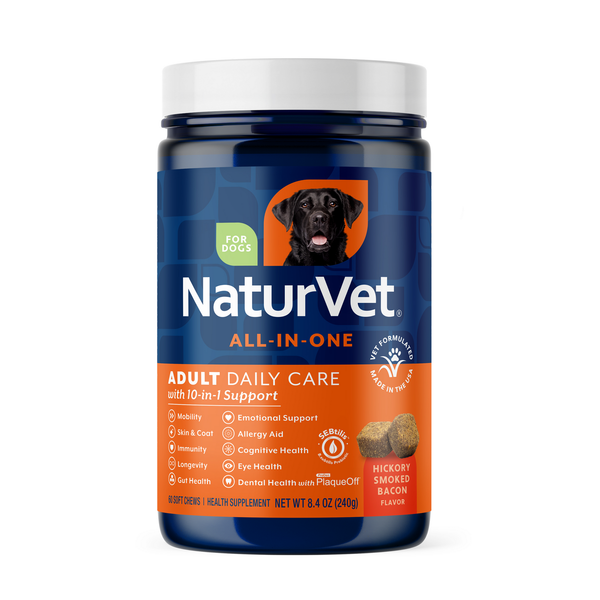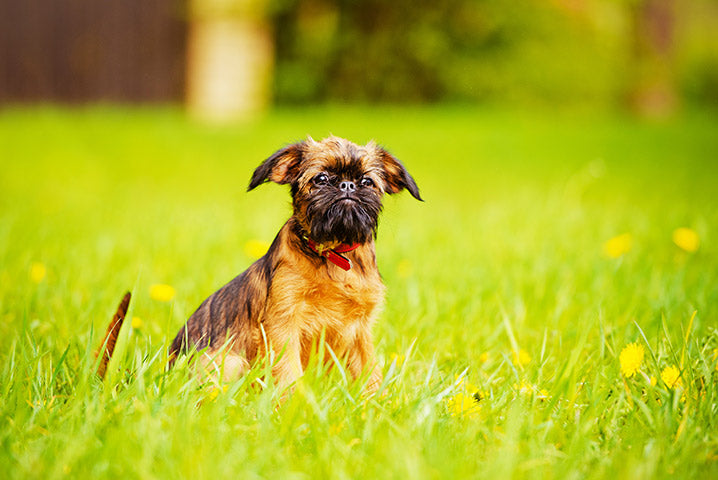Is Dog Urine Killing Grass On Your Lawn?
Why and How to Prevent It
There’s nothing that supports a homeowner’s pride more than a well-kept lawn. And there’s nothing that invites a neighbor’s or landlord’s ire more than the patchy, yellow, dead grass pattern of urine spots.
Is dog urine killing grass on your lawn? Read on to learn why this happens, and several ways to prevent your pup’s pee from spotting the green landscape. Get ready and settle in: ur-ine for a fun and educational read!
Urine: Grass Killer 101
Not all dog urine is going to be a problem for grass, but there are 3 factors that contribute to a pup’s pee transforming into a grass killer. These three factors are the pH of the urine, the amount of nitrogen content, and how concentrated the urine is. We’ll go over each one in turn.

Back to Basic Chemistry: Urine pH
Just when you thought you could forget about all those basics of middle school and high school chemistry, you’ll have to conjure back one of the basic concepts for a couple minutes.
pH is essentially how acidic or basic (alkaline) a substance is, correlating to a number on a scale from 0 - 14 with acidic substances having a lower number and alkaline substances have a higher number. Distilled water essentially has the most neutral pH at 7.0. Tomato juice falls at around 4 while the acid in our stomachs is at about a 1 on the scale, which is why acid reflux can be so uncomfortable. Baking soda is at about a 9 while Chlorox bleach hangs around 13 and can be caustic and dangerous if ingested.
A particular dog’s urine can also be in different places on the acid/base scale. Neutral or mildly acidic urine is actually healthier, as it discourages bacterial growth in urine and can prevent the formation of certain kinds of bladder stones. Typically diets high in meat protein will help contribute to a lower pH. Dog urine often falls around 7-7.5 on most urine samples I evaluate in practice.
But some certainly go a little higher than that, into the 8.0 or 8.5 range. When urine gets to be this alkaline, it can become caustic and damaging to a living substance like grass. It can even be irritating over time to the skin, as some pup parents may be familiar with if their pet has an incontinence issue and often have to make sure a skin rash isn’t developing.
An alkaline urine pH is probably the leading cause of why urine is damaging to grass and is likely related to diets lower in meat protein. A dog that consumes a very high meat protein diet is likely to have a more acidic pH, maybe in the 6-6.5 range, which could also be damaging to grass, but this is less common. More on the diet discussion later.
Nitrogen: Too Much of a Good Thing
Nitrogen is a large component of ammonia, urea, and uric acid, which are all excreted in urine. Ammonia is essentially what smells and makes your eyes water if you come across urine that’s been sitting for awhile, like an accident in the home you didn’t know about and find a week later, or a litter box that was neglected for a couple days.
Nitrogen products are the result of protein break-down from both animal and plant-based proteins. Plants like grass actually require certain levels of nitrogen to thrive, but there’s a narrow window for this. In higher amounts, nitrogenous waste products can be toxic and damaging to living substances. Even in a diet low in meat protein (with a resultant more alkaline urine pH), nitrogenous waste can still be found with higher levels of plant-based protein, like soy. Thus, all dogs are going to have these waste products in their urine, just like we humans do, but the levels can be variable.
Time to Concentrate--On Concentration
Urine concentration is essentially how dehydrated the urine is. Think about your own water intake to illustrate. If you drink a ton of water during the course of the day, your own pee is going to look pretty clear, not unlike water itself, which we would call dilute urine. Now change gears and think about when it’s hot outside or you’ve been exercising and not keeping up well with fluid intake. Your pee is going to look really dark yellow. This is because your body is trying to conserve as much water as possible since you’re not providing enough of it. The resultant urine waste product is then really packed full of all of the other waste products and this is called concentrated urine.
Really concentrated urine, since per volume of pee it has far more concentrated waste products and is going to be far more alkaline without more water to buffer it, is going to be more damaging to grass.
How to Help Your Lawn (and Win Back Your Neighborhood Pride)
Firstly, if you already have a pretty damaged-looking lawn, you’ll need to employ a treatment to correct this before you can focus on prevention.
Two methods you can employ include an actual lawn treatment and physically replanting affected areas of grass. When choosing a lawn treatment, make sure it’s a more natural organic product that uses enzymes to neutralize the damaging salts left behind by urine, and indicates it has been tested as being safe for dogs.
If you choose to replant your grass, make sure to go with a grass type which is naturally more resistant to the effects of urine. According to DoodyCalls, a nationwide pet waste management company, Ryegrass and Fescue are the most resistant to urine, while Kentucky Bluegrass and Bermuda are the most sensitive.
Some products out there are even a combination grass seed with the appropriate neutralizing enzymes, accomplishing two tasks in one.
Another small tip to help choose the right type of grass or to see if the soil itself needs adjustment, is to contact your local state cooperative extension office. You may be able to request a free soil sample kit that you can use to send in a sample and get a report on what needs your soil may have.

Pee Damage Prevention
Once you’ve helped your lawn on its way to recovery, or if you’re dealing with only some early or mild signs of urine spotting and grass damage, there are four suggestions to follow that can help you keep your lush green pride and joy healthy.
Urinary Acidifiers
As discussed, alkaline urine pH is a top cause contributing to grass death. DL-Methionine, is an amino acid, which is actually required by the body, but when additionally supplemented to your pup can help to acidify the urine and get it into a more neutral or slightly acidic urine pH.
As promised earlier, we’ll chat just a little more about diet here. In theory, you could help acidify your dog’s urine by changing the diet to one with more primary meat protein. This is also reasonable, but there are two things to consider.
Raw food and home-cooked diets are purported by some, but these have to be considered with a high level of caution. The definition of a raw food diet can have different meanings, but utilizing actual portions of fresh raw meat as part of your dog’s diet is a big public health concern for anyone preparing the food and as such is generally discouraged by veterinarians. Home-cooked diets, unless formulated by a veterinary nutritionist, have proved to very often be lacking in vital nutrients that commercial pet foods include as a standard. Thus, these also have to be considered carefully.
Secondly, it might seem like a simple idea to just go grain free. After all, grain free diets should be lower in carbs and higher in protein, right? Well, not necessarily. There are many other plant-based sources of carbs other than grains that are often used in grain-free diets, so they still can have a varying percentage of meat protein. In addition, some concerning correlation between some grain free diets and the heart disease dilated cardiomyopathy have led many veterinarians over the past year to encourage their pet owners to change back to more traditional diets until we all know more about this emerging issue. As the article from Tufts in the link above outlines, grain-free diets aren’t universally bad, but caution should be taken with feeding them until a better cause and effect can be established.
And because of this now complicated issue, it might very well be easier and safer to use a reputable urinary acidifier supplement.
Binding Nitrogen
Binding and deactivating excess nitrogen in urine waste is a second very important component to keeping a healthy lawn. Yucca schidigera is a flowering plant native to the Mojave Desert and some other desert regions. When Yucca extract is supplemented it has been demonstrated to actively bind ammonia in urine, one of the three main nitrogenous waste products, thereby reducing the nitrogen damage to your grass.
Dilution is the Solution!
You’ve heard the saying, “dilution is the solution to pollution”. While probably not universally true, it can help here. By providing your pup with enough fresh water and ensuring she is drinking regularly, her urine will thereby be more diluted and have a lower concentration of waste products per volume.
Similarly, it can help to water your grass regularly, as the added water will also in theory dilute out the waste products in the soil.

Use a Dedicated Area to Urinate
It may seem almost too simple, but when all else fails, find a dedicated area for your pup to pee, in a less publicly visible location. Some areas are already prone to poor grass growth because of poor sunlight conditions or other factors, and you could choose these places for your pooch to eliminate.
You can also manufacture a dedicated location and train your pup to use it with a potty training aid spray. Depending on your dog’s size, an area about 2-3x his length and width could suffice. This could be a sectioned off area of crushed stone or gravel, to help with appropriate drainage. But since many dogs prefer grass to eliminate on, you can also look into artificial turf. There are several companies that make artificial turfgrass with pets in mind. As long as adequate drainage is allowed for, this method is very eco friendly.
It’s Time to Think Spring!
With Spring coming up soon, it’s time to start thinking about your lawn-care strategy. If your beloved pup is inadvertently part of the challenge to keeping your lawn green, hopefully some of these tips can help. Eliminating these challenges can only help to increase the bond you share with your special furry friend!























